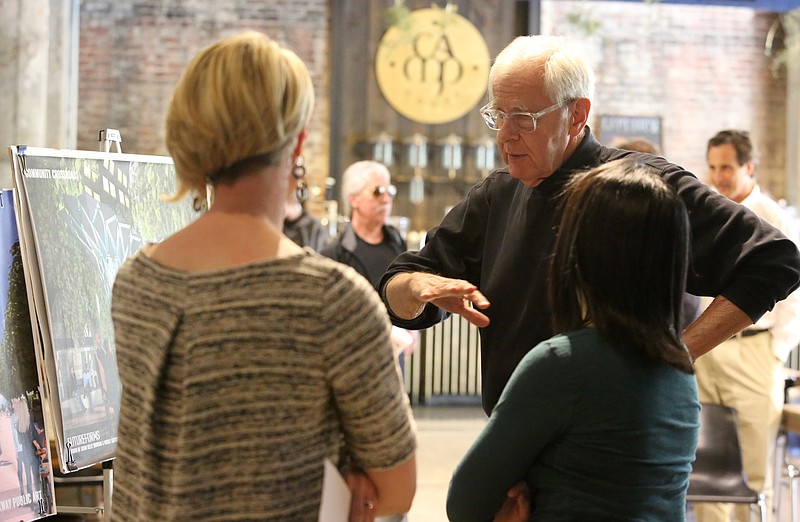Final plans for the renovation of Patten Parkway were unveiled Monday night, but they did not include any specific plans for the three military-related memorials which have been part of the block for nearly 70 years.
For many years, an American Legion Post 14 flag pole (near the Lindsay Street entrance), a Tennessee quartzite and Georgia granite World War II monument in the center of the parkway (with the names of 680 county war dead), and a memorial dedicated to Hamilton County Marines who gave their life in service to the country (at the Georgia Avenue entrance) have been monuments to area residents who sacrificed their lives and treasure.
Blythe Bailey, the administrator of the Chattanooga Department of Transportation, said at the unveiling of plans that the monuments would be relocated to another site that has yet to be identified.
A year ago, the city filed an intention to petition the Tennessee Historical Commission for a waiver that would allow it to relocate and rededicate the three military-related memorials either on "a plaza at the terminus of the new public space of Patten Parkway" (across Lindsay Street in what is now a parking lot) or in Phillips Park at the corner of McCallie Avenue and Georgia Avenue.
The city received permission from the Tennessee Historical Commission to relocate the monuments, Bailey said Monday.
That's true, as far as it goes.
But the body actually conditionally approved the first of what became three alternatives - that the monuments be moved to a plaza across Lindsay Street from the east end of Patten Parkway. The problem is the space is currently private property, but the assumption by city officials during the October meeting was that the city might be granted an easement for a plaza on the property, which was said to be owned by American Legion Post 14.
The easement would be necessary - which was the basis for the condition - because the historical commission made it clear it had no intention of approving the removal of monuments to private property. If it did, members said, that would be the end of any historical commission oversight of the monuments.
"I would stringently object to them being located on private property," said Judge David Tipton, a member of the commission. "I would have a hard time for this Commission to relocate these kinds of memorials that we have jurisdiction to a private property, where we lose it."
However, the commission also added a second condition for relocation, leaving open the possibility that a third yet to be designated site might be the final resting place for the monuments. That site also would be a memorial plaza, according to meeting testimony, and is being vetted by a group headed by Frank Hughes, a Chattanooga area veteran.
Bailey, at the October meeting, told the commission that the city has asked Hughes "to put together a diverse committee that represents all facets of the military that would undergo a public process to help us identify [a] location." He said if a location is identified and has consensus, then fundraising and construction would follow. He said he believes the committee and the city "would want to do this on currently city land to avoid the additional hurdle of trying to acquire property."
The commission designated December 31, 2020, as the date by which the city would come back before the commission if it wanted to move forward with a third site.
City attorney Phil Noblett also said in the October meeting the city didn't believe the proposed move of the monuments "will cause confusion to people that are looking for the site because we're trying to put something that will dedicate this area for all folks of world wars here, or wars since World War I, to have them together in one location."
However, no mention was made during Monday's unveiling of "something that will dedicate this area for all folks of world wars here."
In many cities with left-leaning leadership across the country, monuments to war dead have been removed and never relocated, the idea being that war is not something to dwell on and its dead should not be glorified. Indeed, some of that sentiment - or lack of interest in what had been done before, or why - seemed to be present with a comment in the historical commission meeting.
"There is no real reason for the monuments being where they are now ... ," said an "unidentified speaker," according to meeting testimony. "There's no significance to the place other than that's where they were placed."
But of course there was significance. The monuments were placed on Patten Parkway because it was a visible spot around which business and commerce occurred daily. The city, for years known for being patriotic, wanted the monuments where they were placed so they could be seen.
Fortunately, with the oversight of the Tennessee Historical Commission, we don't believe these remembrances will be lost, though they will be securely stored indoors, until a new site is selected. And we hope the public soon will hear about action on either one of the sites where the monuments might find ultimate rest.
